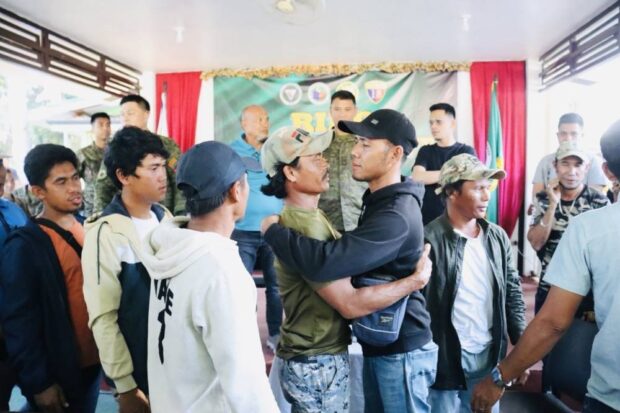Warring clans in Basilan towns end years of ‘rido’

HISTORIC HUG | Representatives of warring clans in Basilan province give each other a hug during simple rites on Saturday, Dec. 16, 2023, inside the camp of the Philippine Army’s 64th Infantry Battalion in Barangay Tumahubong in Sumisip town after their leaders and followers signed the ceremonial peace pact and swore an oath as gestures of reconciliation to end years of conflict. (Photo from the Philippine Army 101st Brigade)
ZAMBOANGA CITY, Zamboanga del Sur, Philippines — Four warring families in the towns of Ungkaya Pukan and Al-Barka in Basilan province have decided to bury their grudges against each other through an amicable settlement facilitated by the Armed Forces of the Philippines and witnessed by local officials on Saturday.
The clan wars, locally called “rido,” which had killed numerous persons from opposing sides, included those being waged by two families in Al-Barka town since 2018 and those that raged on between two families in Ungkaya Pukan since 2020, said Brig. Gen. Alvin Luzon, commander of the Philippine Army’s 101st Brigade based in Basilan.
Former Ungkaya Pukan Mayor Joel Maturan said he could not count the exact number of people who lost their lives to the conflict between Amil Palluh, 64, and Jhomie Majaran, 50, in the town’s Barangay Bohe-Suyak in the last three years but he said politics had triggered the conflict as the two were supporters of two opposing political figures in the area.
Maturan still has photographs of the abandoned houses owned by Palluh’s relatives in Sitio Dekdep of Barangay Bohe-Suyak destroyed by followers of Majaran, following the killing of Majaran’s relatives and supporters last year.
According to Maturan, the owners of those houses have settled in another part of the village where they felt safer.
“They don’t really know how to do politics,” said Maturan, who served his last term in 2010.
Innocent lives lost
“A number of innocent civilians, women and children have been killed [in the course of the conflict],” said Luzon.
On Dec. 2, the conflict further claimed the lives of Muhal Palluh, 29, another Palluh family member, and Saddam Immuh, 35, a Palluh follower, in a shooting incident in Sitio Dekdep.
The victims worked for a newly elected village chief of Barangay Bohe-Suyak when attacked by armed men. They sustained multiple gunshot wounds that led to their immediate deaths. One of Palluh’s relatives was also wounded.
Aside from these deaths, Palluh’s relatives counted 21 houses and four motorbikes destroyed by Majaran’s supporters, using mallets and heavy metals.
The Majaran family also lost quite a number of men and a woman in the armed conflict, said Maturan.
“This time, with this settlement, at least we can breathe the air of peace. We pray to Allah that [there will be] no more recurring ridos in the future,” Maturan said.
As a gesture of reconciliation inside the Army’s 64th Infantry Battalion camp in Barangay Tumahubong, Sumisip town, the warring clans and their supporters signed a ceremonial peace pact and sealed it with an oath before the Quran on Saturday, in simple rites facilitated by military officials and witnessed by local government officials.
Healing, forgiveness
In Al-Barka town, the warring families of Sattar Sappaludin (also known as “Ombol”) and Adzhar Usman (also known as “Jungga”) signed a similar peace pact on Saturday.
“We don’t have the actual number of people who perished in a five-year rido between these two families but for the record, [residents of] five barangays have been displaced because of their feuds,” Luzon said.
Sappaludin’s clan members live in the villages of Kuhon Lennuh, Kuhon, and Magkawa, while that of Usman live in Barangay Sangkahan.
“These peace pacts signify healing and forgiveness,” Luzon added. “[We hope these will] eventually resolve the differences and lead to more harmonious living in the community.”
“[The peace pacts] were officially sealed in a religious rite, strengthened with a solemn oath on the Holy Quran,” he added.